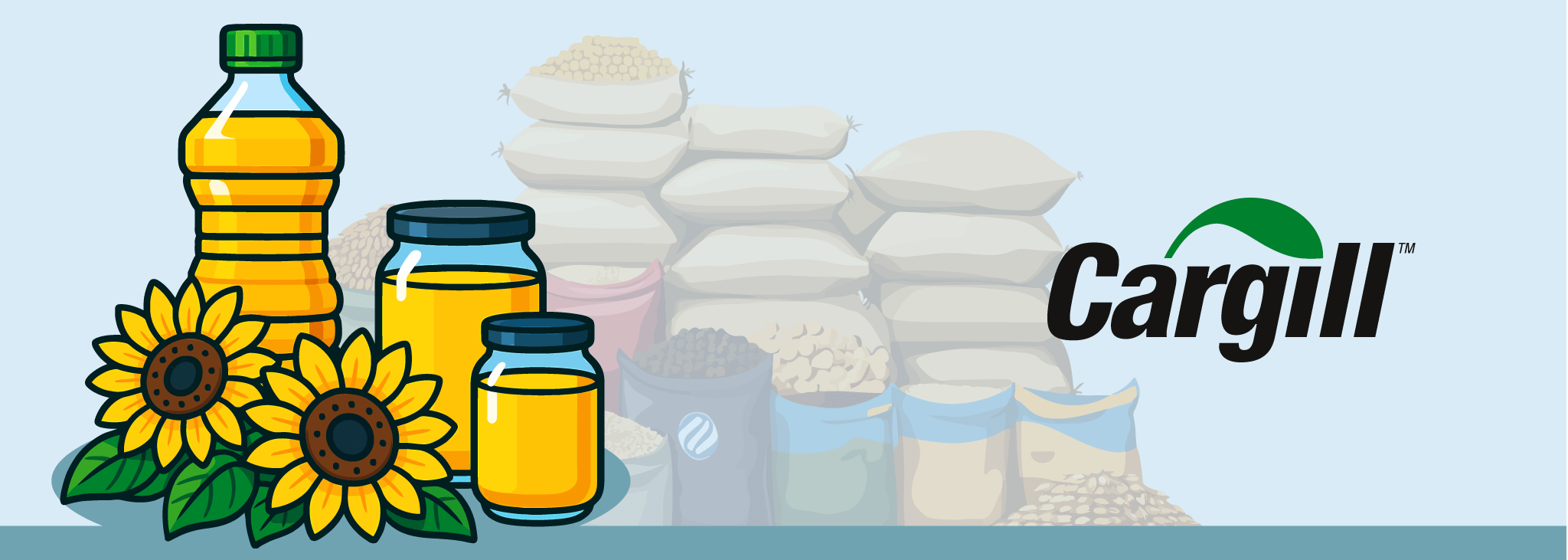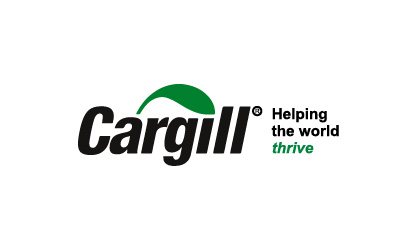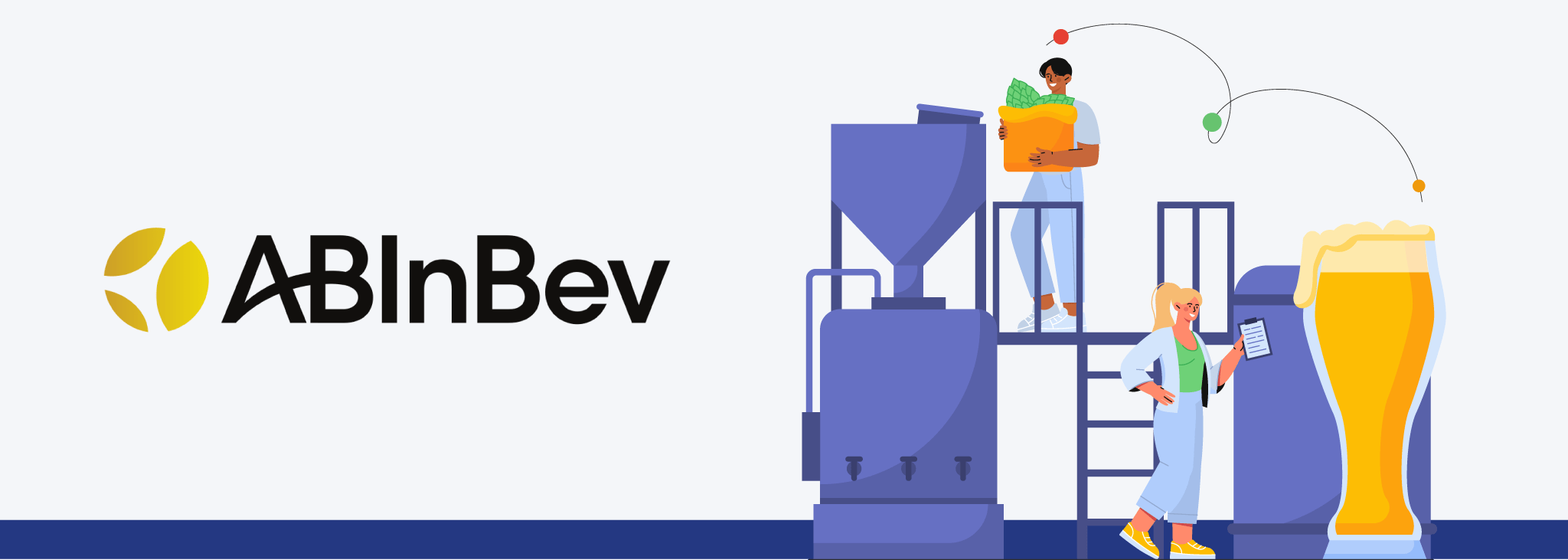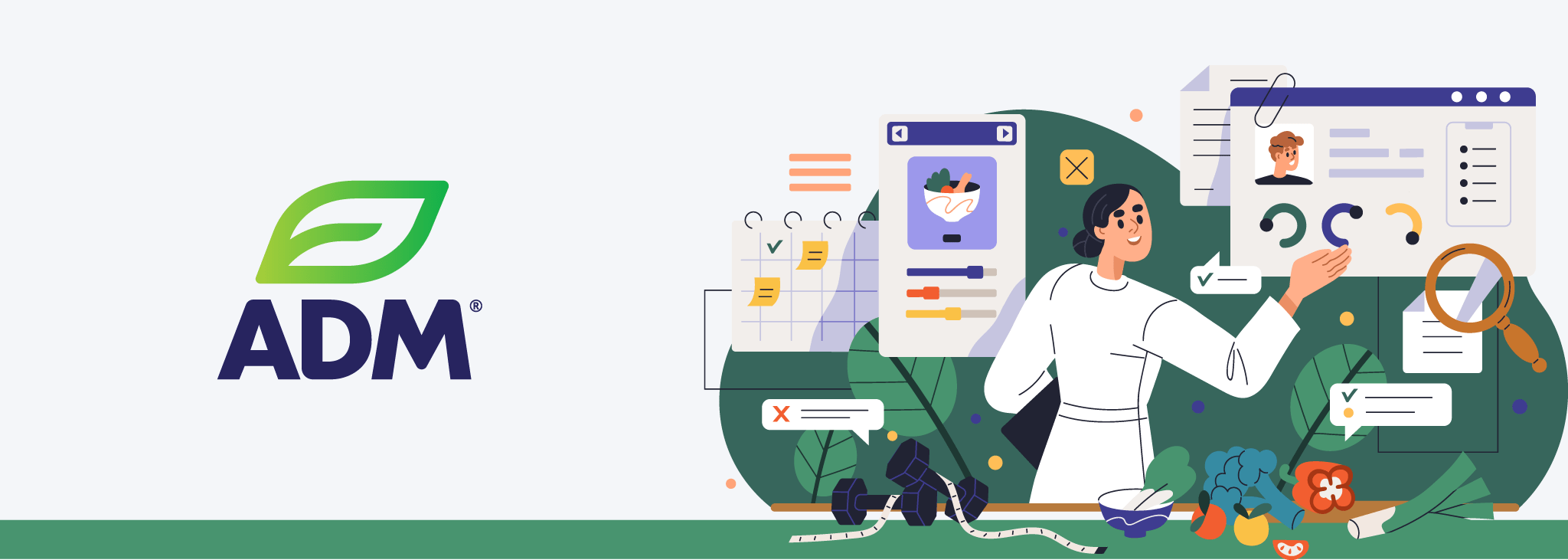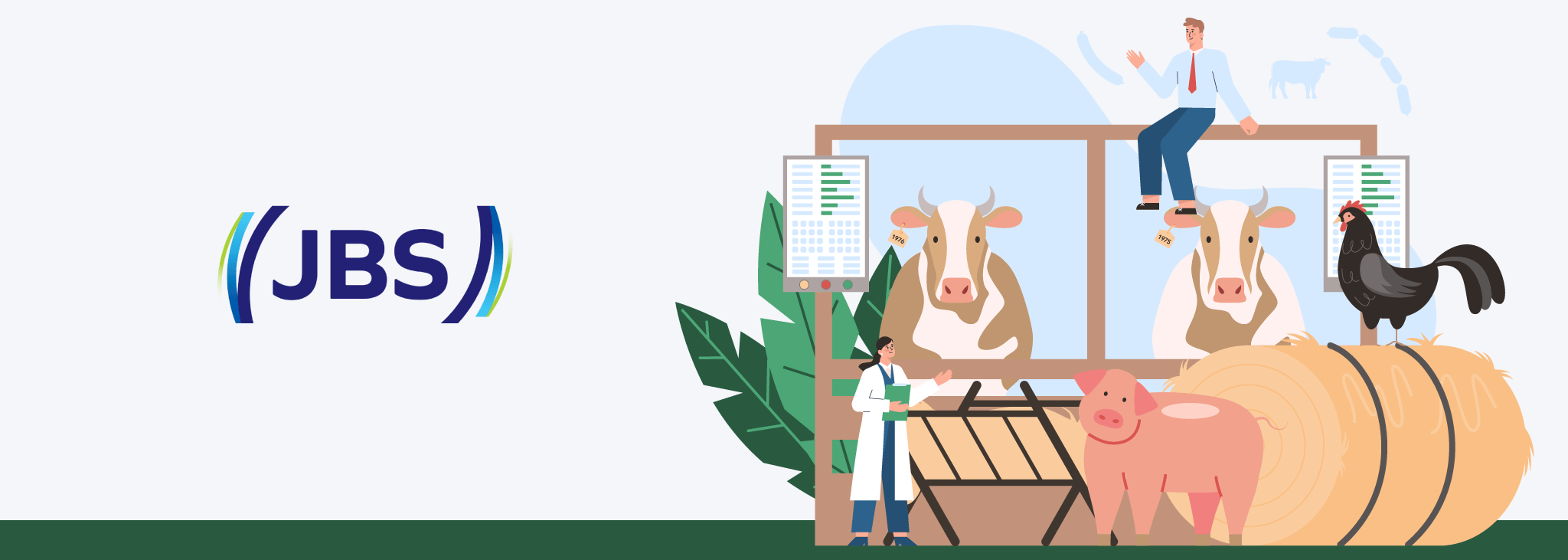Company Overview
Cargill Statistics: Cargill, Incorporated is a global food and beverage enterprise dedicated to delivering safe, responsible, and sustainable food and agricultural solutions that help nourish communities around the world. The company supports a wide range of customers, including food manufacturers, foodservice operators, retailers, farmers, and consumers through an extensive portfolio of food products, ingredients, animal nutrition, and industrial solutions.
Its operations span the marketing, processing, and distribution of grains, oilseeds, sugar, meat, and cotton, as well as the production of natural ingredients used in personal care, pet food, animal feed, and bio-industrial applications. Cargill also offers technical expertise, data-driven solutions, logistics and transportation services, and comprehensive risk management and marketing support. Additionally, it produces and supplies starches, sweeteners, fuel ethanol, and biodiesel.
The company aligns its global strategy around 3 core focus areas: Climate, Land and Water, and People.
- Cargill has a direct operational presence in 70 countries.
- It serves customers in 125 countries worldwide.
- The company leverages 159 years of experience across its international operations.
History of Cargill. Inc
1800’s
- 1865: William Wallace Cargill opens a grain warehouse in Conover, Iowa, at the end of the McGregor & Western Railroad line, laying the company’s foundation.
- 1875: The company relocates its headquarters to La Crosse, Wisconsin, enabling broader regional access to grain markets.
- 1880: Cargill constructs its first terminal grain elevator and ventures into flour milling, expanding its early value-chain involvement.
- 1895: The marriage of Edna Cargill and John H. MacMillan unites the two families that continue to own the business today.
- 1899: John H. MacMillan Sr. assumes operational control, steering the company through early financial and management challenges.
1900’s
- 1909: With the passing of founder W.W. Cargill, the MacMillan family formally takes leadership of the enterprise.
- 1917–1918: Cargill plays a critical role in supplying grain during World War I as global food demand surges.
- 1930: Cargill, Incorporated is officially formed, marking the start of its international expansion with offices in Europe and South America.
- 1936: John H. MacMillan Jr. converts president and restructures operations under the unified “Cargill” name.
- 1942–1945: During World War II, the company constructs naval tankers at Port Cargill and earns the Army-Navy “E” Award for industrial excellence.
- 1945: The acquisition of Nutrena Mills signals Cargill’s formal entry into the commercial animal-nutrition industry.
- 1953: Establishment of TRADAX in Antwerp marks a major step in expanding global grain-trading capabilities.
- 1955–1957: Cargill opens its central research center and implements its first computer, setting the stage for research-led operations.
- 1961: The company acquires the Belle Isle salt mine, marking its entry into the salt-production business.
- 1965: Cargill celebrates 100 years and accelerates expansion across Japan, Thailand, and Latin America.
- 1970s: The company diversifies aggressively into steel, financial services, and food processing, becoming the largest privately held company in the U.S.
- 1980s: Cargill enters cocoa, coffee, palm oil, fertilizers, and metals markets, while becoming an early adopter of Temple Grandin’s humane livestock-handling standards.
- 1990s: Initiates its employee stock-ownership program and aggressively expands, including the acquisition of Continental Grain’s commodity-trading business in 1999.
2000’s
- 2000s: Strengthens its food and feed portfolio through major acquisitions, including Agribrands, Cerestar, and Provimi.
- 2008: Launches Truvia™, a natural stevia-based sweetener; also scales cocoa operations in Ghana.
- 2010s: Grows strategically in aquaculture nutrition, animal feed innovation, and sustainable-agriculture solutions.
- 2015: Marks its 150th anniversary and begins a global restructuring initiative to streamline operations.
- 2020: Introduces extensive COVID-19 support programs focused on workforce protection and community resilience.
- 2021–2022: Records the highest earnings in its history, reaching $6.2 billion in FY2022.
- 2022: Acquires Croda’s bio-based industrial business, reinforcing its nature-derived ingredient portfolio.
- 2023: Brian Sikes becomes the company’s 10th CEO, bringing global experience and a strong emphasis on customer-centric growth.
- 2024: Cargill reorganizes into three new business enterprises — Food, Ag & Trading, and Specialized Portfolio — to drive future scalability.
- 2025: Expands into renewable transportation fuels through the acquisition of SJC Bioenergia and achieves the top global ranking for eliminating industrially produced trans-fatty acids (iTFAs) from its food portfolio.
(Source: Company Website)
Employee Analysis
- North America accounts for 31% of Cargill’s total workforce.
- Latin America represents 22% of employees across the company.
- Europe, the Middle East, and Africa collectively account for 14% of Cargill’s employee base.
- The Asia–Pacific region holds the largest share of Cargill’s employees, at 33%.
- Cargill engages 160,000+ employees worldwide as of 2024.
(Source: Cargill, Incorporated Sustainability Report)
Cargill’s Year-End Sustainability and Community Impact Statistics
- Cargill invested $100 million in operational efficiency and sustainability-focused capital initiatives.
- Around 38 billion litres of water have been restored in regions affected bywater scarcity.
- Women now hold 7% of all leadership positions across the organization.
- The company directed $130 million toward strengthening communities worldwide.
- Scope 1 and 2 emissions were reduced by 8% compared to the 2017 baseline.
- Approximately 1 million acres in North America have shifted to regenerative agriculture methods since 2020.
- More than 2 million farmers have received training through Cargill programs since 2017.
- Cargill contributed 34 million meals globally through its corporate giving and humanitarian initiatives.
(Source: Cargill, Incorporated Sustainability Report)
Cargill’s 2025, Social & Operational Performance Statistics
- Cargill invested $69 million in operational efficiency improvements and sustainability-related capital projects across its global facilities.
- The company helped restore 91 billion liters of water in regions facing high water stress, strengthening local watershed resilience.
- Since 2017, Cargill has delivered 7 million farmer training sessions, supporting skills development and sustainable agricultural practices.
- Through its global corporate giving programs, Cargill facilitated the distribution of 144 million meals to communities in need.
- Cargill achieved a 9% reduction in Scope 1 and Scope 2 emissions from its 2017 baseline, surpassing its internal decarbonization goal.
- The company has supported regenerative agriculture across 5 million acres in North America since 2020, promoting soil health and long-term productivity.
- Cargill invested $110 million in community development initiatives worldwide, focusing on education, nutrition, and economic empowerment.
- Employees and alums contributed more than 77,000 hours of global volunteer work, strengthening Cargill’s community engagement footprint.
(Source: Cargill, Incorporated Sustainability Report)
Cargill’s Key Focus Areas Statistics
Climate
- The company’s Cargill business units have set goals, including targeting a 10% reduction in absolute operational emissions by 2025.
- Aiming to cut emissions across the global supply chain by 30% by 2030, measured per ton of product.
Land
- Supported 2.5 million acres of regenerative agriculture practices across North America since 2020, strengthening soil health and long-term productivity.
- Reduced 1,580 metric tons of water pollutants while expanding access to safe drinking water and sanitation for 350,000+ people globally since 2020.
- Insights from Cargill’s 2024 U.S. RegenConnect farmer survey highlighted key benefits: 75% of participants reported improved crop yields, 95% noted lower soil erosion, and 85% experienced better water infiltration—showcasing the measurable impact of regenerative farming methods.
Water
- Enabled the restoration of 91 billion liters of water in regions facing water stress during the year.
- Achieved a reduction of 1,580 metric tons of water pollutants through targeted water quality initiatives.
- Improved access to safe drinking water and sanitation for 350,000+ people across communities where Cargill operates.
- Aiming to restore 600 billion liters of water and reduce 5,000 metric tons of water pollutants across water-stressed supply chain regions by 2030.
- Targeting enhanced access to clean drinking water and sanitation for 500,000 people in priority communities by 2030.
(Source: Cargill, Incorporated Sustainability Report)
Employee Engagement
- 7% of employees have positive levels of engagement.
- 80% of employees agree that Cargill is creating an inclusive workplace.
- Fortune 100 average engagement level: 81%.
- Fortune 100 average inclusivity score: 74%.
- 1M+ training hours completed globally.
- 5,000+ employees trained in the use of generative AI.
- 3,400+ leaders trained worldwide on building safe, inclusive, high-performing workplaces.
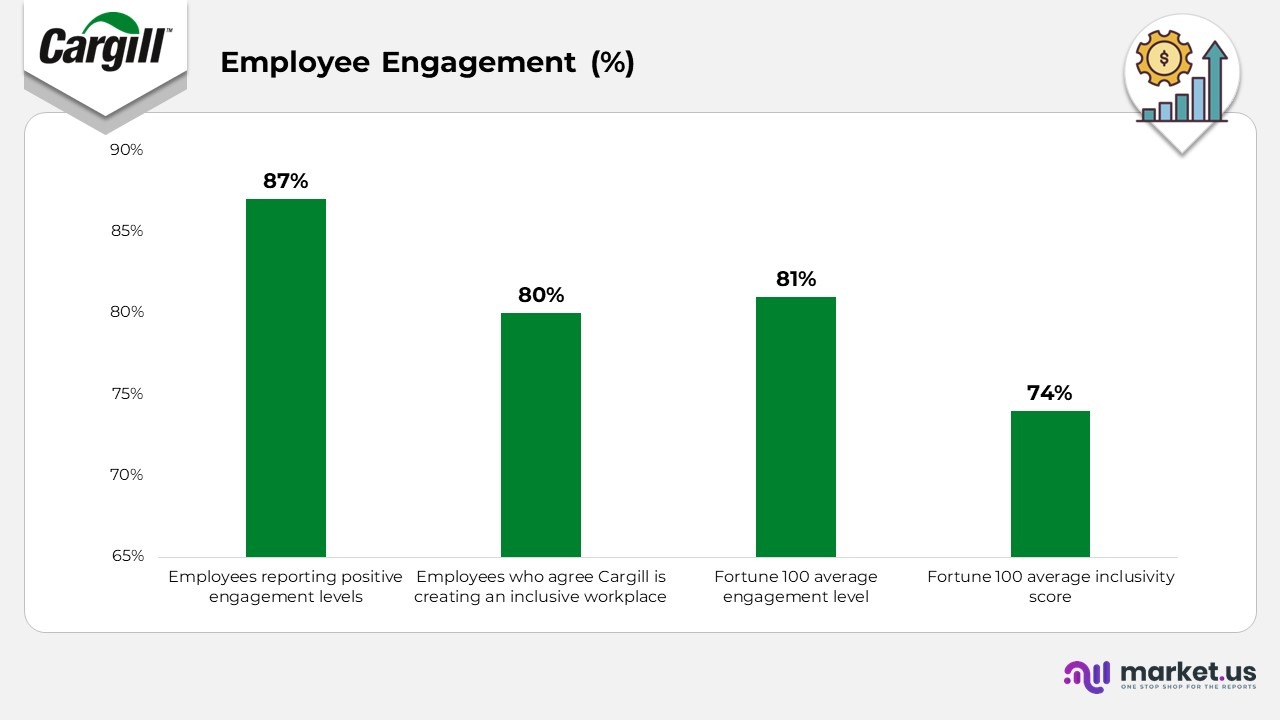
(Source: Cargill, Incorporated Sustainability Report)
Cargill’s Year of Impact Statistics
- The company provided 144 million meals globally through Cargill’s corporate giving initiatives.
- Contributed over 77,000 volunteer hours through employee and alumni engagement worldwide.
- Invested $110 million across 72 countries to support community partners and local development programs.
- Prepared and distributed 1,200 relief packages with essential supplies to families affected by Typhoon Yagi in Vietnam (2024).
- Cargill employees collectively contributed more than $110 million and volunteered over 77,000 hours during the past year to strengthen global community support efforts.
(Source: Cargill, Incorporated Sustainability Report)
Cargill Aqua Nutrition Statistics
- Operates 26 facilities across 13 countries, supporting global aqua nutrition operations.
- Runs 17 specialized aqua feed mills dedicated to species-specific nutritional needs.
- Delivered 94 million tonnes of aqua feed in 2024, serving diverse aquaculture markets.
- Maintains 5 R&D innovation centers, advancing species nutrition and sustainable feed solutions.
- Employs 2,000+ people across the Aqua Nutrition supply chain.
- Nourishes 12 aquatic species groups, including salmon, tilapia, shrimp, barramundi, striped bass, catfish, flounder, yellowtail, rainbow trout, coho salmon, snakehead, and crab/crayfish.
- Operates a global network of feed mills and innovation centers located in the S., Canada, Mexico, Ecuador, Chile, Norway, Austria, India, Thailand, Vietnam, and China.
- Serves the market through well-recognised global brands, including Cargill, EWOS, Purina (outside the U.S.), AquaXcel, and LiquaLife.
Palm Oil
- The company operates 20 refineries as part of its integrated supply chain network.
- Cargill manages 9 mills that support processing and production activities.
- Runs 3 kernel crushing plants to support downstream value creation.
- Owns 9 plantations contributing to the raw material supply.
- Partners with 24,700+ smallholders cultivating more than 50,300 hectares of land to strengthen supply chain resilience.
- Provided training to over 35,300 farmers in 2024, up from more than 30,850 trained in 2023.
- Increased refinery volumes classified under the NDPE IRF “Delivering” category from 74% in 2023 to 89% in 2024, reflecting stronger compliance and performance.
- Supported more than 40,100 farmers through services and partnerships in 2024, compared to 36,800+ in the previous year.
- Achieved a cumulative reduction of 235,000 MT of CO₂e through methane capture initiatives equivalent to taking nearly 25,000 gasoline-powered vehicles off U.S. roads for one year.
- Engages with a supply base that includes 1,415 indirect mills and 289 direct mills, enhancing visibility and accountability across the sourcing network.
(Source: Cargill, Incorporated Sustainability Report)
Cargill – 2024 Traceability KPI Progress Statistics
- Cargill achieved a 99% global traceability rate to the mill level across its palm and palm kernel supply chains.
- The company recorded a 74% global traceability rate to the plantation level, demonstrating improved upstream oversight.
Mill-Level Traceability (Palm & Palm Kernel)
- All other markets reached 100% traceability for both palm and palm kernel volumes.
- China reported 91% traceability for palm and 85% for palm kernel materials.
- India achieved 99% traceability for palm, while palm kernel data was not applicable.
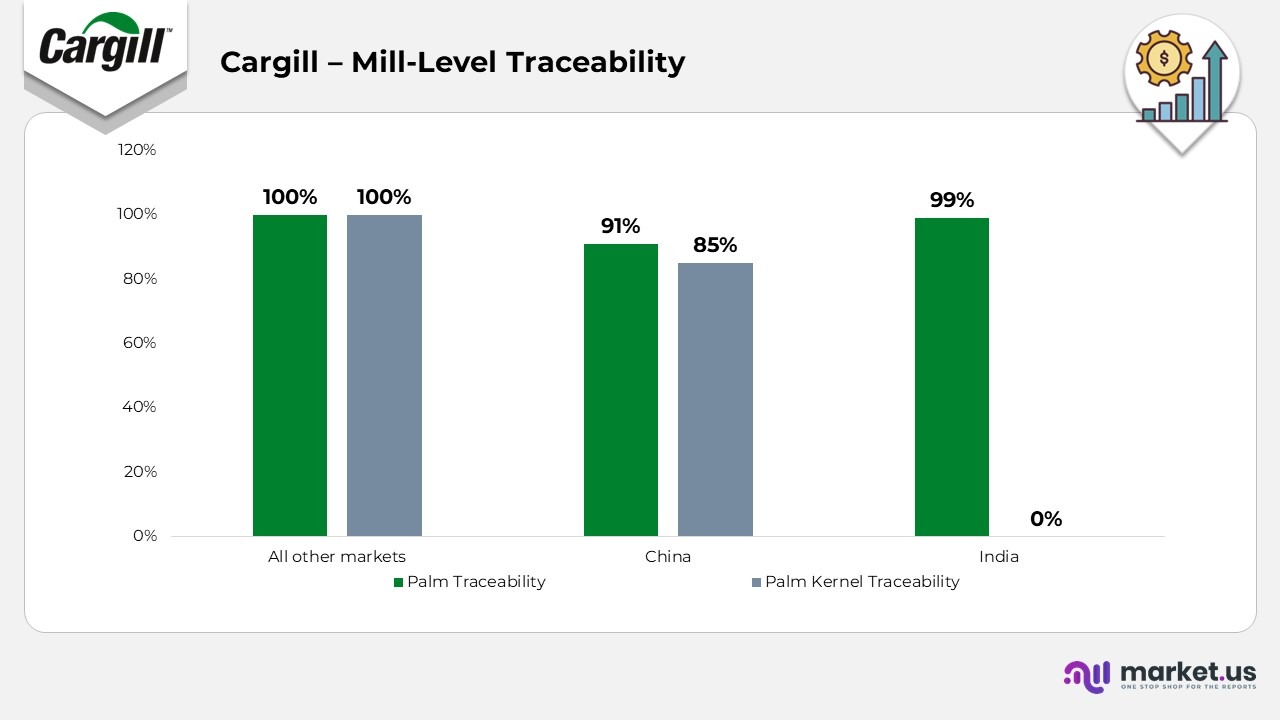
Plantation-Level Traceability (Palm & Palm Kernel)
- Australia and New Zealand attained 100% traceability for palm, with palm kernel data not applicable.
- Brazil recorded 89% plantation-level traceability for palm and 79% for palm kernel.
- China achieved 85% traceability for palm and 75% for palm kernel volumes.
- Europe maintained 87% traceability for palm and 78% for palm kernel supplies.
- India had 54% traceability at the plantation level for palm, with palm kernel not applicable.
- Indonesia reached 89% traceability for palm and 67% for palm kernel.
- Malaysia reported 69% traceability for palm and 55% for palm kernel.
- Mexico achieved 74% traceability for palm and 88% for palm kernel materials.
- Pakistan recorded 66% traceability for palm, with palm kernel not applicable.
- Russia reached 86% traceability for palm and 73% for palm kernel.
- Turkey recorded 33% traceability for palm and 61% for palm kernel.
- The United States achieved 98% traceability for palm and 82% for palm kernel.
- Other markets maintained 85% traceability for palm and 82% for palm kernel.
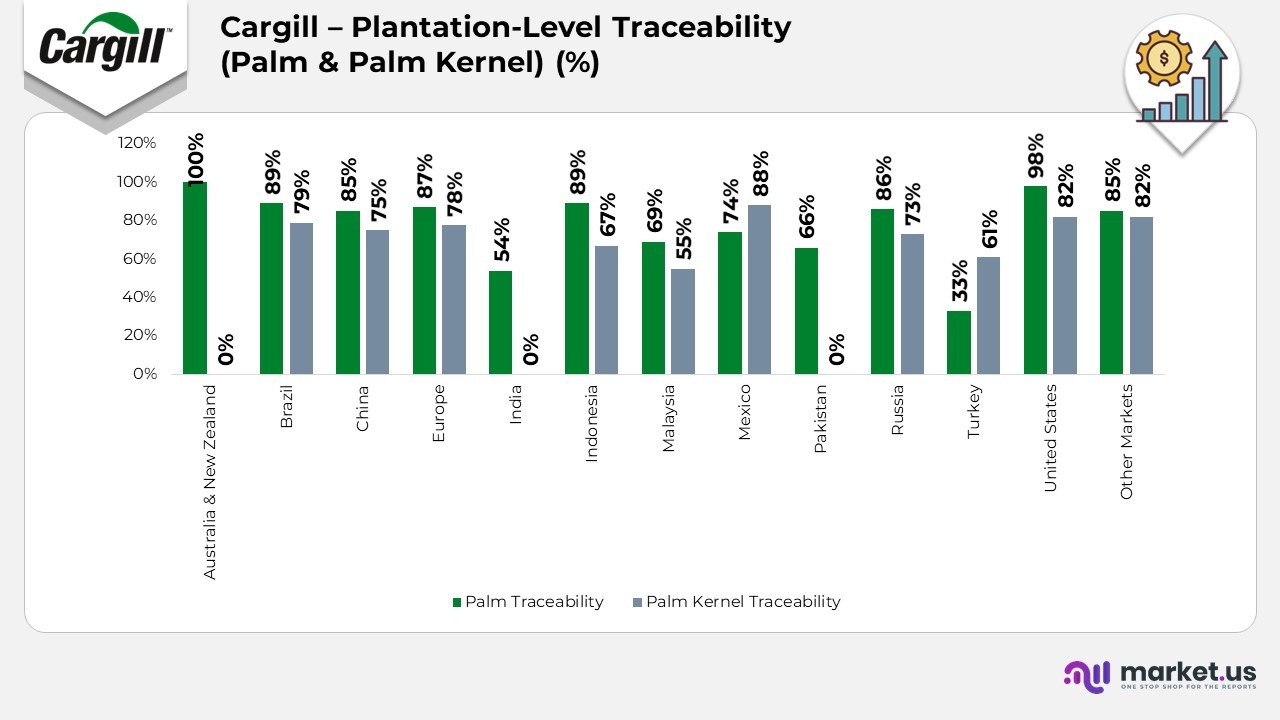
Cargill 2024 Grievance Management KPI Progress Statistics
- Cargill recorded 36 grievances involving direct third parties and 77 involving indirect third parties during the reporting period.
- A majority of logged grievances originated from Indonesia (70%), followed by Malaysia (17%), Latin America (8%), Papua New Guinea (4%), and Myanmar (1%).
Deforestation-Related Grievances
- 11% of cases are currently under investigation.
- 3% of grievances are in the verification stage.
- 9% are progressing through the action-plan development phase.
- 23% are undergoing active monitoring of implementation.
- 25% of cases have been formally closed.
- 29% have been suspended following review.
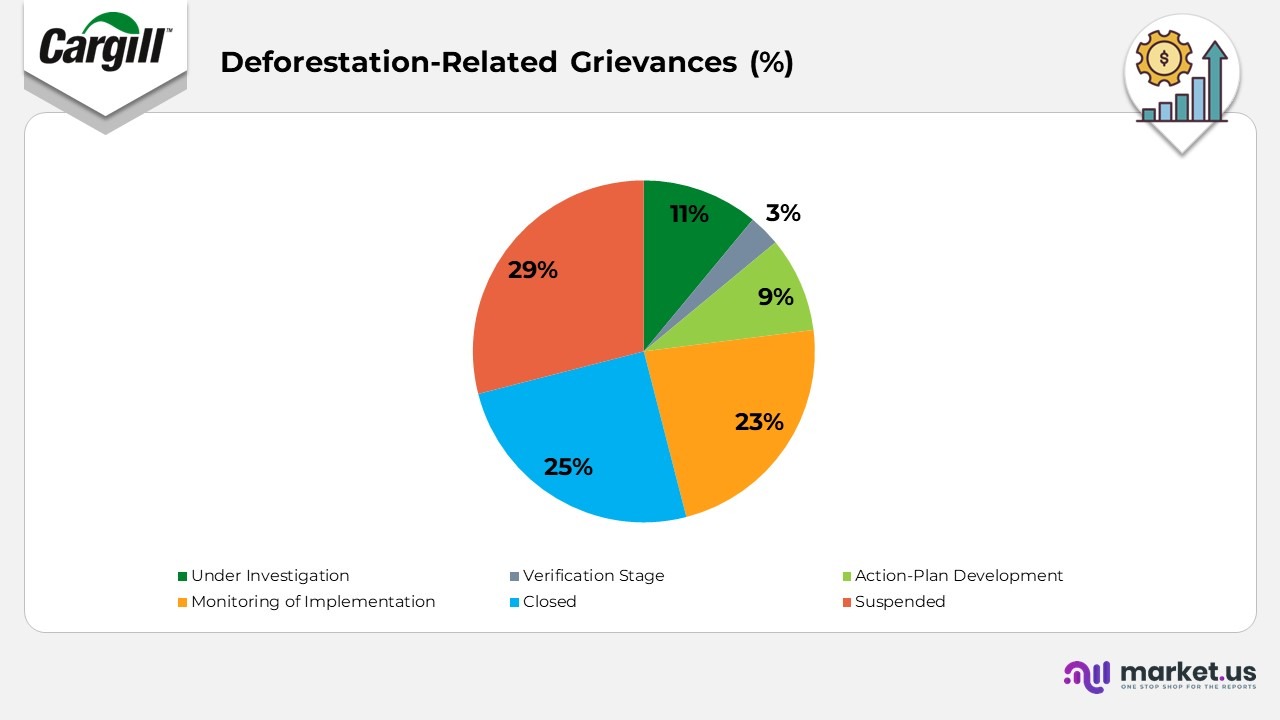
Labor and Human Rights Grievances
- 12% of grievances are under investigation.
- 0% are currently in the verification phase.
- 3% are developing an action plan.
- 30% are being monitored for progress in implementation.
- 33% of grievances have been closed.
- 21% have been suspended.
(Source: Cargill, Incorporated Sustainability Report)
Cargill Incorporated Statistics
| Patent / Publication Title | Type | Patent / Publication No. | Filed Date | Publication / Grant Date |
|---|---|---|---|---|
| Development for Modifying the Properties of Citrus Pulp | Grant | 12442130 | Oct 27, 2023 | Oct 14, 2025 |
| User Interface Functionality and Enhancements for Commodity Pricing Arrangements | Application | 2025/0315889 | Jun 17, 2025 | Oct 9, 2025 |
| Seaweed Flour | Grant | 12433308 | Oct 7, 2019 | Oct 7, 2025 |
| Treated Vegetable Protein Product and Method of Making the Same | Application | 2025/0287974 | May 8, 2023 | Sep 18, 2025 |
| Genetically Modified Yeast and Fermentation Procedures for the Manufacture of Xylitol | Application | 2025/0283028 | May 5, 2023 | Sep 11, 2025 |
| Genetically Modified Yeast and Fermentation Processes for the Production of Arabitol (ARD2DH) | Application | 2025/0277193 | May 5, 2023 | Sep 4, 2025 |
| Treated Soy Protein Product and Method of Making the Same | Application | 2025/0275552 | May 8, 2023 | Sep 4, 2025 |
| Genetically Modified Yeast and Fermentation Processes for the Production of Arabitol (APDH) | Application | 2025/0277244 | May 5, 2023 | Sep 4, 2025 |
| Genetically Modified Yeast and Fermentation Processes for the Production of Ribitol | Application | 2025/0277242 | May 5, 2023 | Sep 4, 2025 |
| Genetically Modified Yeast and Fermentation Processes for the Production of Xylitol (XPDH) | Application | 2025/0277243 | May 5, 2023 | Sep 4, 2025 |
| Vegan Fat Particles and Use in Plant-Based Sausage Analogue | Grant | 12402644 | Jul 26, 2024 | Sep 2, 2025 |
| Shortening with Crystalline Fat | Grant | 12389923 | Mar 27, 2020 | Aug 19, 2025 |
| Spectroscopic Estimation of Unsaponifiable Matter in Tallow | Grant | 12385833 | Jul 30, 2021 | Aug 12, 2025 |
| Thermolabile Stains for Meat Alternatives | Grant | 12376609 | Sep 14, 2023 | Aug 5, 2025 |
| Process for Adapting Gluco-Oligosaccharides | Application | 2025/0236898 | Oct 11, 2022 | Jul 24, 2025 |
| Oil Compositions | Grant | 12349693 | Nov 20, 2018 | Jul 8, 2025 |
| Composition Suitable for the Replacement of Glucose Syrup | Grant | 12342840 | Sep 4, 2020 | Jul 1, 2025 |
| Fish Feed Equipped from Oilseed Plants Omega-3 Fatty Acids | Grant | 12336552 | Jun 1, 2017 | Jun 24, 2025 |
| Frying Oil Maintenance | Grant | 12336660 | Mar 20, 2020 | Jun 24, 2025 |
| Container (Design Patent) | Grant | D1101570 | Sep 9, 2022 | Nov 11, 2025 |
(Source: Justia Patents)
Recent Developments
- In October 2025, Cargill partnered with Mars and GoldenPeaks Capital on a 224 MWac solar procurement project in Poland, creating the main multi-consumer renewable energy contract in Poland and across Eastern and Central Europe.
- In October 2025, Cargill expanded its retail feed facility in Granger, Washington, modernizing operations with automated bag-checking, evaluating, ultra-low-tolerance mixing and treating systems, AI-based bag-sealing assurance, pedestrian-sensing mobile equipment, and full production-line automation.
- In July 2025, Cargill acquired Mig-Plus in Brazil, strengthening its animal nutrition portfolio and offering more comprehensive solutions to local producers.
- In July 2025, Cargill partnered with PepsiCo to empower farmers through initiatives that advance sustainable and regenerative agriculture.
- In June 2025, Cargill partnered with Biotech to boost animal feed production in Mindanao by opening a new production line in South Cotabato, improving feed accessibility for farmers.
- In June 2025, Cargill invested nearly $90 million in automation and new technologies at its Fort Morgan, Colorado, beef plant, advancing its Factory of the Future initiative and adding to the $24 million already invested since 2021.
(Source: Cargill Incorporated Press Releases)


